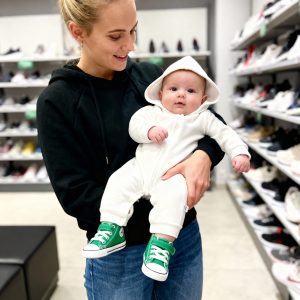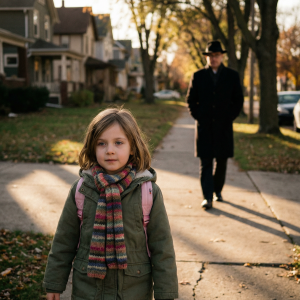People claimed I was past my prime, utterly alone, and too damaged to make a difference—until I brought home an infant nobody else would consider. Seven days later, eleven gleaming Rolls-Royces materialized outside my house, and everything I believed about this child shattered into pieces.
I never expected to share a story like this. At seventy-three, widowed and weathered, most folks figure women like me should occupy themselves with yarn crafts, daytime television, and preparing for what comes next. But my twilight years haven’t followed that predictable script. What happened instead leaves my hands shaking every time I recount it.
I’m Donna. This wind-battered house in rural Illinois has been mine for close to fifty years. I raised two sons within these walls. I said goodbye to my husband here. This porch has witnessed both snowdrifts and sympathy bouquets. Sure, I’ve accumulated plenty of living—but nothing equipped me for what unfolded after Joseph’s death.
Losing Joseph felt like being hit by a locomotive I never saw coming. Nearly half a century of partnership doesn’t prepare you for that caliber of void. Without him, even the hallway clock’s ticking became unbearable. He’d been my anchor, my constant, the person who kept fresh coffee brewing and remembered to fill the gas tank when I’d forget.
The evening following his service, I perched on our bed’s edge, clutching his flannel shirt that still carried traces of aftershave and peppermint. Tears didn’t really come—I just fixated on the wall hook where his jacket had permanently hung. Can’t explain it, but the entire house seemed to deflate into hollowness.
My only companions were the strays I’d rescued over time: primarily cats, plus a few elderly dogs the shelter couldn’t place. My kids despised this arrangement.
“Mom, this place reeks,” Laura, my daughter-in-law, complained one visit, her nose scrunched as she lit some lavender candle.
“You’re becoming one of those eccentric cat hoarders,” Kevin, my son, chimed in, surveying the room like he was mortified to be present.
After that confrontation, their visits evaporated—despite me spotting their social media posts featuring wine tours and lakefront vacations. My grandchildren once dropped by regularly for homemade cookies, but now even text responses are rare.
Christmas hit hardest. I’d prepare Earl Grey and position myself by the window, watching snow accumulate on the front steps, contemplating how a residence once bursting with vitality could become so desolate.
I genuinely tried. Joined a gardening collective. Started library volunteering. Even delivered banana bread to our local fire station. Nothing plugged the chasm Joseph’s absence created. Grief, I’ve discovered, doesn’t vacate the premises. It hovers in doorways, ambushing you during every silent interval.
Surrounded by crowds, I’d feel invisible—a phantom drifting past unnoticed.
Then one Sunday at church, everything pivoted.
I was organizing hymnals in the storage area when I caught two volunteers murmuring near the coat hooks.
“There’s an infant at the shelter,” one whispered. “Female. Down syndrome. Nobody’s claiming her.”
“Who’d want that kind of baby?” the other responded. “Way too demanding. She’ll never have anything close to a regular existence.”
Their words stabbed clean through me. Without hesitation, I spun around. “Where can I find her?”
The younger volunteer blinked rapidly. “I’m sorry?”
“I need to see her,” I stated.
That afternoon, I drove to the shelter. The space was cramped, carrying faint notes of formula and disinfectant. And there she lay—impossibly tiny, swaddled in a worn, threadbare blanket. Her fists curled beneath her chin, her lips producing the gentlest little sounds while she dozed.
When I leaned over her crib, her eyes opened gradually. Wide, dark, inquisitive eyes. She studied me like she was attempting to decode who I was, and something dormant inside me—something I’d assumed had permanently calcified—suddenly burst open.
“I’m taking her,” I announced.
Silence blanketed the room. A woman wearing a crimson cardigan glanced up from her paperwork.
“Ma’am…” the caseworker faltered. “Given your age—”
“I’m taking her,” I reiterated.
She scrutinized me extensively, anticipating I’d reconsider. I didn’t budge.
Carrying that infant home felt like introducing sunlight into a dwelling that had forgotten warmth existed. Not everyone interpreted it that way, though.
Neighbors started gossiping. I’d catch them peering through curtains like I was some carnival attraction.
“That unhinged widow,” I overheard Mrs. Caldwell grumble while watering her flower bed. “First that menagerie, now a special needs infant?”
Kevin barged in three days afterward, face crimson with rage.
“Have you lost your mind?” he bellowed, invading my kitchen like he still retained authority here. “You’re seventy-three! You can’t parent an infant. You’ll be gone before she reaches adolescence!”
I stood at the stove, cradling the baby protectively. Her minuscule hand gripped my cardigan collar like a lifeline.
“Then I’ll cherish her with every remaining breath,” I said evenly.
Kevin’s expression contorted. “You’re embarrassing this entire family.”
I really looked at him—truly studied him. “Then you’ve forfeited the privilege of calling yourself family,” I replied, and closed the door firmly.
I named her Clara. A miniature onesie in her hospital bag bore that name embroidered in purple thread. Good enough for me. Clara. It resonated perfectly.
Within seven days, she started smiling. Each time her fingers wrapped around mine, it felt like she’d spent her whole existence waiting for me.
Precisely one week later, I detected engines.
Multiple engines. That deep, commanding rumble that raises goosebumps. I stepped onto the porch holding Clara, and my breath hitched.
Eleven obsidian Rolls-Royces aligned themselves before my dilapidated little house. Their chrome blazed in the afternoon sunlight, their windows so tinted I couldn’t glimpse inside.
Then the doors opened.
Men in impeccable black suits emerged sequentially, resembling government operatives or some clandestine organization.
They advanced deliberately. One raised his hand and rapped on my door. My knees nearly buckled.
A tall man with graying temples and composed, professional demeanor stepped forward.
“Are you Clara’s legal guardian?”
I adjusted Clara on my hip and nodded.
“Yes,” I managed hoarsely. “What’s this about?”
He extracted a leather portfolio, retrieved an envelope, and extended it without elaboration. My hands trembled as I unsealed it. Inside were documents—official papers bearing embossed stamps, accompanied by a legal firm’s correspondence.
I lowered myself onto the porch swing, securing Clara close while I scanned the opening page.
Clara wasn’t some random abandoned infant. Her biological parents had been youthful, accomplished tech innovators—building rapidly, living boldly, apparently possessing generous hearts. They’d perished in a catastrophic house fire mere weeks after her birth.
Clara was their singular child. Their exclusive heir.
Everything they’d accumulated—from an expansive upstate estate to investment portfolios, vehicles, and a bank account that made my jaw drop—belonged to her. But because nobody claimed her, everything had remained trapped in legal purgatory.
Until me.
I looked up at the suited figures standing motionless on my lawn, those eleven black vehicles gleaming like some surreal hallucination.
“You’re saying… she owns all this?” I asked.
A younger man wearing glasses advanced. “Yes, ma’am. Everything belongs to Clara. And as her legal guardian, managing it until she reaches adulthood falls to you.”
I glanced down at Clara, her cheek nestled against me, exhaling softly in slumber. I couldn’t determine whether to laugh, weep, or collapse.
Inside, the attorneys outlined the possibilities. They presented architectural blueprints and estate photographs: a mansion featuring twenty-two rooms, marble flooring, manicured grounds, a pool house, and staff accommodations.
“You and Clara can relocate immediately,” one explained. “We’ll arrange staff—nannies, nurses, a household manager. You can raise her in luxury and protection.”
Momentarily, my imagination ran wild—crystal chandeliers, a nursery trimmed in gold, a concert grand in the parlor, a chef preparing heart-shaped pancakes.
But then Clara shifted, producing that little whimper she always made when needing closeness. I looked down at her, and the fantasy disintegrated like stale crackers.
That wasn’t love. That was wealth masquerading as affection.
“No,” I said, patting Clara’s back.
The attorneys blinked. “Ma’am?”
“I won’t raise her in some gilded prison. I didn’t bring her home to polish her like silverware. I took her because nobody else would.”
I straightened my spine more than I had in months. “Sell the mansion. Sell the vehicles. Everything.”
“But—”
“You heard me correctly.”
So we did exactly that.
And with every dollar, I constructed two things that mattered.
The Clara Foundation, bearing her name, would supply therapy, education, and scholarships for children with Down syndrome. I wanted no child like Clara to ever hear they were “excessive work” again.
And I built the animal sanctuary I’d always envisioned. Nothing extravagant, but warm, featuring open pastures and shelter for strays nobody claimed. My house remained unchanged, but now an extended barn beside it bustled with rescue dogs, blind cats, and three-legged chickens.
People labeled me reckless. Irresponsible. “You could’ve had everything,” a woman hissed at me in the supermarket. “You’re squandering her future.”
But I’d never felt more purposeful.
Clara matured in a home overflowing with fur, laughter, music, and commotion. She was a whirlwind—inquisitive, imaginative, and stubborn as granite.
“Clara, stop! The cats don’t need glitter!” I’d holler as she toddled past, distributing sparkles everywhere.
She painted walls, furniture, even the kitchen tiles. She adored banging on the piano, belting songs—perpetually off-key, but radiating joy that saturated the room.
Physicians cautioned she might never articulate fluently or regulate her emotions. But Clara proved them wrong.
She attended school, cultivated friendships, and even got disciplined for kissing a boy in the library at seven.
At ten, she mounted the stage at a Clara Foundation gathering, microphone quivering in her grasp, and proclaimed, “My grandma says I’m capable of anything. And I believe her.”
I sobbed so intensely that evening, volunteers had to support me.
Years accelerated past. Clara grew tall, poised, with dark eyes and a smile capable of dissolving any heartache. At twenty-four, she worked full-time at the sanctuary—cleaning enclosures, bottle-feeding kittens, maintaining a notebook documenting each animal’s personality.
One afternoon, she entered, cheeks flushed.
“There’s a new volunteer, Grandma. His name’s Evan.”
I raised an eyebrow. “Is that why you’re suddenly brushing your hair and wearing perfume to the barn?”
She laughed and hurled a cushion at me.
Evan had Down syndrome too. Reserved, contemplative, patient—he counterbalanced Clara’s tornado energy. He sketched animals in a little notebook and perpetually carried candy in his pocket for the dogs.
I watched them fall in love gradually, gently—the way love should unfold.
One evening, Evan appeared at my door, shirt tucked meticulously, palms perspiring.
“Mrs. Walker,” he said nervously. “I love her. I want to care for her. Forever. May I?”
I embraced him tightly. “Yes, Evan. Absolutely, yes.”
Last summer, Clara married in the garden behind our sanctuary.
She wore an understated white dress with lace sleeves, daisies woven through her hair. Cats wandered among the guests. Evan, dressed in a blue suit and sneakers, waited at the altar, radiant.
Kevin didn’t attend. Neither did Laura. They sent a card—and that provided sufficient closure for me.
But Evan’s family welcomed Clara with laughter and tears, as though she’d always belonged to them.
During the vows, Clara clasped Evan’s hands. “You are my person. I choose you,” she declared.
Her smile could’ve illuminated the heavens.
I sat front row, a kitten on my lap, reflecting on everything we’d conquered.
The stares. The whispers. The people who insisted I was destroying her life.
She won’t survive a year.
That baby will never be cherished.
And yet there she stood—cherished beyond measure.
Now I’m elderly. My back protests, my knees complain whenever I garden too extensively. My children still don’t call. Kevin relocated to Arizona. Laura posts beach photographs. I’ve stopped monitoring.
But I don’t require them.
I have Clara. I have Evan. I have a sanctuary where the unwanted come to heal. I receive letters from families who obtained Clara Foundation scholarships, photographs of children learning to walk, speak, and sing.
Clara gave me that.
She gave me an existence richer than any luxury vehicle, grander than any inheritance.
And when my time arrives—and it isn’t distant now—I’ll depart peacefully. Not because I was wealthy, or celebrated, but because I chose love over fear.
Because I looked at an infant nobody wanted and declared, “I’ll take her.”
And ultimately, she didn’t just rescue me.
She rescued thousands.
Her tiny hand gripping mine that first day launched everything I never realized I needed.
So perhaps—just perhaps—someone reading this will experience that pull in their heart. The one whispering: Do it. Love regardless. Take the leap.
Because sometimes, the smallest, most unwanted soul can transform everything.
Do you think my decision to welcome my beloved Clara was right? What would you have approached differently in my position?
Note: This work draws inspiration from real events and individuals, but has been fictionalized for creative purposes. Names, characters, and details have been modified to protect privacy and enhance the narrative. Any resemblance to actual persons, living or deceased, or actual events is purely coincidental and unintended by the author.





